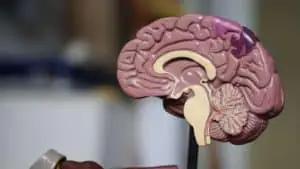WHAT YOU NEED TO KNOW ABOUT BRAIN FOG

Have you ever experienced brain fog? That is when your brain feels full of puffy clouds instead of neurons and axons.
The trouble is, this fog doesn’t show up on a brain scan, and sometimes a misdiagnosis can happen.
I have had brain fog so seriously that I received a medicine given to patients with Alzheimer’s disease after struggling through 3 days of neuro-psychological testing in Boston. Some of the symptoms include.
• Difficulty concentrating
• Diminished memory
• Finding it hard to focus
• Poor communication skills
• Low motivation
• Easily distracted
WHAT CAUSES BRAIN FOG?

Briefly, brain fog results from an imbalance in the brain’s control center, the hypothalamus. This imbalance can be a result of inflammation or stress brought on by several factors, such as:
• Multi-tasking
• Exhaustion
• Anxiety
• PTSD
• Imbalanced hormones
• Infections
• Not getting enough sun exposure
• Substance abuse
I was evaluated by numerous doctors and clinics in Boston who couldn’t do any better than say my mental changes were “part of having MS.”
My medical records indicated my cognitive functioning was, shall we say, a notch or two lower than Dekker, my black lab, in the ability to focus and remember department.
It was devastating to hear this conclusion because they were saying they could do nothing more. “It’s goes with having MS.”
That’s when I visited a naturopath and began to learn about the impact of lifestyle choices on my brain.
CAN BRAIN FOG BE CURED?
I learned that mental fog could result from a busy, nonstop lifestyle for anyone, not just for someone with a neurological diagnosis.
And it could be associated with what we eat.
Now, this is sensitive territory. I like to eat! Always have.
Not a big fan of junk food I also had been a vegetarian for a couple of years. So I didn’t quite believe what the naturopath was telling me.
With nothing to lose, supplements – along with significant changes to my diet became a way of life.
I cut way back on processed foods and avoided gluten in all products.
 And believe me – it is sneaky how many commercial products have this substance in them. Soy sauce was a surprise to me until I discovered Bragg’s Aminos as a substitute.
And believe me – it is sneaky how many commercial products have this substance in them. Soy sauce was a surprise to me until I discovered Bragg’s Aminos as a substitute.
Apparently, processed foods, foods high in saturated fats, and gluten all harm the brain.
Studies have shown gluten sensitivity has been linked to low concentration and focus abilities.
I love to bake homemade bread. This was not good news -but neither is brain fog!
So what can be done if your thinking seems to be stalling out?
Indeed, a thorough medical evaluation is appropriate.
A FEW CHANGES THAT HELPED ME
Here are some of the other lifestyle practices that you may find helpful. Only by giving these a complete trial can any doctor make a meaningful and accurate diagnosis.
I began with diet changes. Eliminating gluten was the most significant change.
It impacted things like eating in restaurants or with friends, baking loaves of bread at home, and dealing with the loss of a yummy taste and texture that had been a staple all my life.
But the payoff was big! I could read a book or listen to a movie all the way through. Carrying on a conversation without getting distracted and sleeping better at night were added gifts!
I have never been a long sleeper, so the hours haven’t changed. But my sleep became qualitatively much different.
Walking increased dramatically. If you wonder how someone with MS can walk enough to matter, read my article about my ‘Afari,’ a recently developed walking bike for anyone with walking challenges. I love that bike!!
And the last thing was learning how to carve out’ me time’. It isn’t selfish to balance family, work, and social responsibilities with ways to ‘chill out.’
Calling it ‘flat time,’ and I kick back and daydream several times a day.
Being retired is helpful for this rhythm.
TESTING THE “CURE”
In this last year, I confess going off all the things that I knew were keeping me clear-headed and focused.
Along with putting on a lot of weight, the big puffy clouds came back, messing up my focus and concentration once again.
ByeBye wheat!
Here it is, three weeks later, no more gluten. No more fog! I feel back!
If you find yourself struggling to focus, think clearly, or remember, you may want to consider the impact of wheat on your brain. In support of what the naturopath was teaching me, I also read a couple of good books and I’ll put the links in here.
Grain Brain by David Perlmutter
Life is such an incredible journey. Especially when you are at least as alert as your dog.
[Photo Credits from Unsplash: Spy sauce by Goodeats; fog hiding mountain by anna-goncharova; puffy clouds by billy-huynh; model of brain by robina-weermeijer; alert dog by andrew-pons]


 Wheat Belly by William Davis
Wheat Belly by William Davis
Bonnie
As I stare at my screen this morning, with my usual early morning brain fog, I found your words especially poignant at the moment. Thank you for sharing your personal story. My bread of choice has been Ezekiel for quite some time. It is flourless, sprouted grain bread. Are you familiar with it Ardis? Based up Scripture passage: Ezekiel 4:9.
Ardis Mayo
I am familiar with it but because I don’t really care for it, I have no experience with it’s side effects. I’m glad you found something you enjoy that I understand is very nutritious.
Judith Sarborough
Hi Ardis, Thank you for this analysis of your experience with brain fog. I try to eat gluten-free, and now I have more reason to do so. (Writing this as I finish the last of a lovely raspberry-almond pastry baked by the husband of Matthew Baker (now Johann-Baker), who Mary Ellen knows [and you may have met Matthew on a visit, too.]. Kyle has started baking for friends and offering his delights for sale, but not shipping yet.) In any event, I have observed that when I am more gluten-free, I do feel better, all over my body. I have not noticed cognitive improvements, but will watch for that going forward. It is amazing what effect food has on our bodies. Thanks for shining a light on this for us! Love, Judith
Ardis Mayo
I would be interested to know if ‘more gluten free’ is as effective for you as ‘gluten free’. I struggled with this boundary until the thought occurred to me that if I were allergic to bee stings, my reaction from a tiny bee may not be a lot different than a big bee. Just a thought……
Diane Jean George
Hi Ardis,
Thanks for your words on brain fog. I am struggling with some of that plus my childhood problem of SLEEP WALKING has returned. Gone so long i had forgotten about it. Sleeping
alone has its challenges. It seems that feeling hungry is a known trigger…i awake either with signs of dishwear showing i had eaten something or …with a knife in my hand cutting an apple. Geese, The dr. has now asked me to eat at these time introvals 11:30 AM; 3:30PM OR 4:00 THEN 8:00 OR 8:15 pm. This so far has banished the sleepwalking. Just sharing.
Would love to know whatever you know about sleepwalking. Google says there is a medication but my dr. said…You don’t want to take that. Okay, i trust him…always best to
rule against medication when we can.
Best Wishes,
Diane (Lee’s friend from NYC)
Ardis Mayo
Diane, I can only imagine how distressful this is and I am glad that your Dr. found a simple step to eliminate it. So many of our health problems can be cured or mitigated by lifestyle choices! Thank you for the suggestion to write about sleepwalking some day. I will do that.
Della
Ardis,
Late last year, I was having trouble with my digestive system, and was diagnosed with Irritable Bowel Syndrome. I was given a list of foods I could eat, and those I could not; the could not list was much longer than the could. Gluten was the biggest no-no, so I started eating gluten free. I was amazed at the foods that contained gluten. If I didn’t pay attention, and ingested gluten accidentally, I almost immediately knew it. When I eat as I should, I feel so much better, and it does seem that I am more mentally alert, so I was very pleased to read this post. I had no idea that gluten could have that effect on our brains.
Thanks!
Della
Ardis Mayo
Thank you for sharing, Della. I suspect that many people suffer from gluten sensitivity and don’t know it.
Francisca
Hi Ardis, late to this party but thought I’d share my experience. I went through serious brain fog around the time I was peri-menopausal and my doctor never did make the connection: I did, eventually. It had triggered hypothyroidism and I had every symptom in the book. Once I was on proper dose of thyroid medication (from a new doctor), it was bye-bye brain fog.
Also, I’m not gluten sensitive (but did go gluten-free for about six months while working on losing the weight of a car tire). My niece is, though, and she has discovered that anything with North American flour triggers her symptoms, but European flour doesn’t. So she can eat Italian pasta, not American-made pasta. Her theory is that it’s related to GMOed wheat. Just sharing in case you’d like to explore.
Ardis Mayo
Interesting information Francisca. Thank you for sharing!